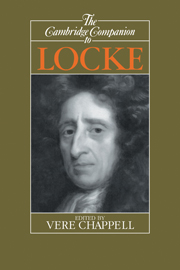Book contents
- Frontmatter
- Introduction
- 1 Locke's life and times
- 2 Locke's theory of ideas
- 3 Locke's philosophy of body
- 4 Locke's philosophy of mind
- 5 Locke's philosophy of language
- 6 Locke's theory of knowledge
- 7 Locke's philosophy of religion
- 8 Locke's moral philosophy
- 9 Locke's political philosophy
- 10 Locke's influence
- Bibliography
- Index
2 - Locke's theory of ideas
Published online by Cambridge University Press: 28 May 2006
- Frontmatter
- Introduction
- 1 Locke's life and times
- 2 Locke's theory of ideas
- 3 Locke's philosophy of body
- 4 Locke's philosophy of mind
- 5 Locke's philosophy of language
- 6 Locke's theory of knowledge
- 7 Locke's philosophy of religion
- 8 Locke's moral philosophy
- 9 Locke's political philosophy
- 10 Locke's influence
- Bibliography
- Index
Summary
Ideas play a large role in Locke's philosophy. In Locke's view, everything existing or occurring in a mind either is or includes an idea; and all human knowledge both starts from and is founded on ideas. The very word “idea” appears more frequently in the Essay concerning Human Understanding than any other noun, - its occurrences outnumber even those of such common words as “he” “have,” and “for.”
Locke's ideas have, however, perplexed readers and provoked critics from the time of the Essay's first publication. His contemporary Edward Stillingfleet, the bishop of Worcester, noted the novelty of the term “idea” and charged that Locke's use of it had encouraged “ill men” to take up the “new way of ideas” and use it “to promote scepticism and infidelity, and to overthrow the mysteries of our faith” (W IV: 129-30). Stillingfleet had no objection to Locke's own use of the word, much less to ideas themselves, since he took these to differ only nomine from the “common notions of things, which we must make use of in our reasonings” (ibid.). But John Sergeant, another contemporary critic, found “idea,” as used in the Essay, to be “highly Equivocal, or Ambiguous”; and he argued that in at least one of the meanings assigned it by Locke the word stands for nothing at all, a “meer Fancie” (Sergeant 1697: 3; Preface). This charge of ambiguity, especially, has been a staple of Locke criticism for three centuries: Thomas Reid advanced it, and so did Gilbert Ryle, who wrote, echoing Sergeant, that not only is “the term ‘idea’ . . . used by Locke in a number of completely different senses,” but “there is one sense in which he uses the term . . . in which it must be categorically denied that there are such things as ‘ideas at all. And, ” Ryle continued, “had this been the only sense in which Locke used the term, then his whole Essay would have been, what it is not, a laboured anatomy of utter nonentities” (Ryle 1933: 17).
- Type
- Chapter
- Information
- The Cambridge Companion to Locke , pp. 26 - 55Publisher: Cambridge University PressPrint publication year: 1994
- 37
- Cited by

